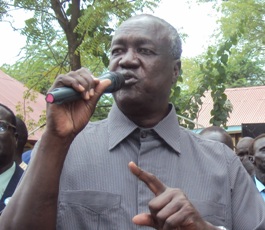Kala-azar, floods threaten human health in Jonglei state
September 4, 2010 (BOR) – Authorities in Southern Sudan’s state of Jonglei say villagers whose houses are trapped by flooding and family members suffering from Kala-azar, face health risks.

Governor Kuol visited Twic East, Duk and Ayod counties on Friday. The three counties are among flood hit areas in Jonglei state alongside Pibor, Fangak, Akobo, Pochala, Uror and Pigi as well as part of Bor.
In Panyagor, the headquarters of Twic East County, the governor’s team and other media houses and families converge in high ground homes. Some huts stand tilting toward the ground in water. Cattle are fed indoors as grazing sites are sunk under water. A flock of dead chickens lies in road’s pavement in the Twic East main town.
At least 33,000 people are affected in Twic East alone, according to South Sudan Relief and Rehabilitation representatives. Twic East commissioner Dau Akoi Jurkuch told the Sudan tribune that local resources are being used to building dykes around severely affected huts.
From the helicopter, water could be clearly seen over neighboring Payam of Wernyol and Kongoor’s Pawel Ajang. Moving northward to Duk County, villagers in Poktap and Duk Deng are trying to build dykes in attempt to stop water from sweeping through the grass thatch huts.
Airstrip at Duk Deng is completely under water for the helicopter to land and the team proceeded to Duk Padiet.
The Duk County commissioner Aluong Macuor Kulang said all residential areas are threatened. Kulang added that cases of diarrhea were increasing among children and elderly people. Local health workers say patients with symptom of Kala-azar are emerging in recent days in Duk.
In Ayod where Kala-azar patients are overwhelming primary health workers, the situation is worsening, according to county commission Thoi Ruet Ret. Ruet said “The situation is alarming. It is becoming impossible to reach [Kala-azar] patients in far locations.”
“In particular, children and elderly people are increasingly suffering from diarrhea,” a health worker identifying himself as James told the Sudan Tribune in Ayod.
There are four health officials in Ayod PHCC including expert in Kala-azar – a disease caused by sand fly. Kala-azar affects viscera and imparts blood production. It has history of reoccurring in northern counties in Jonglei state.
Health officials say the death toll now stands at 59 following the death of one patient early on Friday on September 3.
GOVERNOR’S REACTION
After listening to complains from health workers concerning ratio to patients and seeing the situation of Kala-azar affecting people in Ayod PHCC wards, governor Kuol promised his response.
“This is a disaster. Many people had died and Kala-azar is spreading. We shall make sure that available resources are sent here as soon as possible,” he said.
Also in the state governor’s visit are Gabriel Duop Lam, Jonglei minister of law enforcement and Rodenta Ayen, Jonglei minister of health.
“Though substantial quantities of drugs are stocked in Juba, inaccessibility of Jonglei’s counties impedes timely assistance,” governor Kuol added. He called upon the United Nations Mission in Sudan (UNMIS) to consider providing its helicopter for delivery of drugs and other items needed to rescue the situation. The State governor also appealed to UN agencies to conduct “speedy” survey in order to identify areas of relief.
More than half of southern Sudan population is affected by flood this year. The southern Sudan’s regional government’s minister for humanitarian affairs James Kok Ruei has called for effective disaster management.
(ST)
